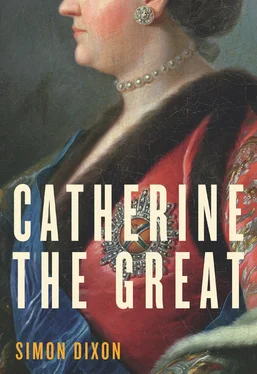Following her twenty-eighth birthday in April, Catherine retreated to Oranienbaum, where the seating plans for her dinner parties were distributed by lot to avoid the torture of official precedence regulations. A French diplomat’s account of the procedure suggests that not everything was left to chance:
Just before we ate, pages came in with gilded vases full of little tickets: these were for us to draw the valentins , a custom which overthrows etiquette and removes all the appointed places, even from princes. The seats are numbered 1, 1; 2, 2; etc. The gentleman who has the same number as a lady sits next to her. This put me on the grand duchess’s left and Monsieur de Poniatowsky on her right. On my other side, I had the princess of Georgia, who spoke only Armenian. The grand duchess took pity on my embarrassment, sometimes joining in the conversation. 52
Anxious to mollify Peter, who was irritated by her refusal to receive his mistress, Elizabeth Vorontsova, Catherine, knowing her husband’s love for music, commissioned Rinaldi and Araja to stage a lavish outdoor spectacle at Oranienbaum on 17 July, paid for by a further British loan at a cost of between 10,000 and 15,000 roubles.
We sat down at table, and after the first course the curtain that hid the main avenue was raised and we saw in the distance the rolling orchestra, drawn by twenty oxen decorated with garlands and surrounded by all the male and female dancers I could find. The avenue was so brightly lit that we could make out everything in it. When the chariot came to a halt, chance had it that the moon hung directly overhead, which made an admirable impression and greatly astonished the whole company. Moreover, the weather was the finest in the world. Everyone jumped up from the table to enjoy the beauty of the symphony and the spectacle. When it was over, the curtain was lowered and we returned to the table for the second course. At the end of this, we heard trumpets and drums and a barker cried out: ‘Roll up, roll up, ladies and gentlemen, get your free lottery tickets here in my booths!’ On both sides of the large curtain, two smaller ones were raised and we saw two brightly lit booths, one of which distributed free tickets for the porcelain lottery, and the other tickets for flowers, ribbons, fans, combs, purses, gloves, sword knots, and other finery of the kind. Once the booths were empty, we went back for dessert, after which we danced until six in the morning.
‘In short,’ as Catherine wrote in her memoirs, ‘on that day people discovered qualities in me that they had not known I possessed, and in this way I disarmed my enemies. That was my aim, but it did not last for long, as we shall see.’ 53
The most disconcerting part of the celebration at Oranienbaum was a fall Catherine suffered when the horse drawing her carriage reared up as she stepped out to inspect the preparations. Fortunately, her pregnancy was unaffected. When her daughter was born at the end of November, she begged Elizabeth to be allowed to choose a name. Instead, the empress pointedly had the child christened Anna Petrovna, in memory of her older sister, Peter’s mother. Peter himself rejoiced at Anna’s birth, though he was surely not her father. Poniatowski, who was, made clandestine visits to Catherine, who remained in solitary confinement while her baby was removed, as Paul had been before her, to the care of the empress’s wet nurses. But worse was still to come for the grand duchess when Chancellor Bestuzhev was arrested, along with Vasily Adodurov and other friends of hers, on the night of 14 February 1758.
When Catherine first arrived in Russia, Bestuzhev had been her greatest enemy. No one had done more to make her life at the Young Court a misery. After the ‘diplomatic revolution’ of 1756, however, as Russia edged ever closer to an improbable alliance with France (her principal continental rival), the Machiavellian chancellor had come to see the grand duchess as a potential counterbalance to his Francophile rivals at Court, the Shuvalovs and the Vorontsovs. Though he was initially horrified to learn from Sir Charles Hanbury-Williams of Catherine’s liaison with Stanislaw Poniatowski, he helped her to conceal it, and it was Bestuzhev, remembered by Stanislaw as a ghoulish figure ‘with a mouth which opened to reveal only four stumps of teeth and a pair of small flashing eyes’, who did most to secure the young Pole’s return to Russia. 54The very chancellor who had prevented her from corresponding with her mother in the 1740s now opened up a channel to Johanna Elisabeth. Meanwhile, the empress’s failing health prompted him to make his own plans for an alternative regime, drafting a manifesto that would place Peter on the throne with Catherine as his co-ruler. She was flattered to discover that the chancellor regarded her ‘as perhaps the only person upon whom at that time the hopes of the public could rest when the empress was no more’. 55
Precisely when Bestuzhev showed Catherine his plans remains uncertain, but the issue of the succession was brought into focus more sharply than ever before when Elizabeth collapsed in public outside her favourite Church of the Sign at Tsarskoye Selo on 8 September 1757. (For an index of the panic she created, we need look no further than the Court journals, which are blank for the following week.) 56Faced with the possibility that the pro-Prussian Grand Duke Peter might come to the throne, Russian generals leading the campaign against Frederick the Great were placed in a delicate position. As recently as 19 August, they had scored a famous victory over the king at Gross Jägersdorf, less than a year after Frederick had himself routed the French at Rossbach. In the wake of such a triumph, General Apraksin had been expected to advance on Berlin. Instead, he retreated to Memel. Driven by the fragility of Russia’s supply line (his troops had to wait while the grass grew under their feet to feed their horses), 57Apraksin’s decision was taken on 27 August—before the empress’s collapse. But in St Petersburg it could easily be made to seem that he had been motivated by doubts about her health, generated by his treasonable correspondence with Catherine and Bestuzhev. Urged on by the chancellor, Catherine begged Apraksin to reverse his retreat. But by then it was too late. In October, he was removed from his command as Bestuzhev’s enemies, profiting from Catherine’s withdrawal from the public gaze in the final months of her pregnancy, steadily poisoned Elizabeth’s mind against him. 58
Catherine learned of Bestuzhev’s arrest from Stanislaw Poniatowski on the morning after it occurred. That evening, as the lovers attended a ball pretending that nothing had happened, she felt ‘a dagger in the heart’. While the chancellor fell under a lengthy investigation that was to end in public disgrace and banishment, Catherine faced a crisis more dangerous than the one in 1744, when it could reasonably be claimed that she had been no more than an unwitting accomplice to her mother’s clumsy pro-Prussian machinations. Now her complicity was harder to deny and it was vital to limit the damage. Following the chancellor’s example, she had burned all her papers as soon as the danger arose. Now, according to the account in her memoirs, which comes closer to her mother’s purple prose than her own customarily deadpan style, she prostrated herself in front of Elizabeth on the night of 13 April and pleaded tearfully to be sent back to Zerbst. While her husband berated her as a liar, she stubbornly refused to admit any treasonable intent in her correspondence with Apraksin. Perhaps, as she suggests, her performance was enough to win Elizabeth over. At any rate, she was given a stay of execution until a further audience six weeks later, when she faced more questioning about her letters to the general. Although we cannot know precisely how the matter was resolved—for one thing, her memoirs dramatically break off at this point—Bestuzhev’s enemies probably decided (just as he had before them) that Catherine could still be useful to them. While he was eventually committed to house arrest on his estate on 5 April 1759 in a manifesto that highlighted his vain attempts to corrupt both Catherine and Peter—the manifesto was published at the beginning of Passion Week, creating an inescapable association with sinfulness—the Vorontsovs and the Shuvalovs left the grand duchess in place as a pawn on the chessboard of Court politics and began to treat her well. 59
Читать дальше












